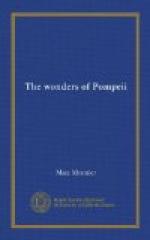Some of the walls of the Basilica were covered with graphites, that is to say, with inscriptions scratched with the point of a nail or of a knife by loungers on the way. I do not here copy the thousand and one insignificant inscriptions which I find in my rambles. They would teach us nothing but the names of the Pompeian magistrates who had constructed or reconstructed this or that monument or such-and-such a portion of an edifice with the public money. But the graphites of the Basilica merit a moment’s attention. Sometimes, these are verses of Ovid or of Virgil or Propertius (never of Horace, singular to say), and frequently with curious variations. Thus, for example:
“Quid pote durum Saxso
aut quid mollius unda?
Dura tamen molli Saxsa cavantur aqua.”
(Ovid.)
Notice the s in the saxo and the quid pote instead of quid magis; it is a Greekism.
Elsewhere were written these two lines:
“Quisquis amator erit Scythiae
licet ambulet oris:
Nemo adeo ut feriat barbarus esse volet.”
Propertius had put this distich in an elegy in which he narrated a nocturnal promenade between Rome and Tibur. Observe the word Scythiae instead of Scythicis, and especially, feriat, which is the true reading,—the printed texts say noceat. Thus an excellent correction has been preserved for us by Vesuvius.
Here are other lines, the origin of which is unknown:
“Scribenti mi dictat
Amor, monstrat que Cupido
Ah peream, sine te si Deus
esse velim!”
How many modern poets have uttered the same exclamation! They little dreamed that a Pompeian, a slave no doubt, had, eighteen centuries before their time, scratched, it with a nail upon the wall of a basilica. Here is a sentence that mentions gold. It has been carried out by the English poet, Wordsworth:
“Minimum malum fit contemnendo
maximum,
Quod, crede mi, non contemnendo,
erit minus.”
Let us copy also this singular truth thrown into rhyme by some gourmand who had counted without his host:
“Quoi perna cocta est,
si convivae adponitur,
Non gustat pernam, lingit
ollam aut caccabum.”
This quoi is for cui; the caccabus was the kettle in which the fowl was cooked.
Here follows some wholesome advice for the health of lovers:
“Quisquis amat calidis
noil debet fontibus uti:
Nam nemo flammis ustus amare
potest.”
I should never get through were I to quote them all. But how many short phrases there are that, scratched here and there, cause this old monument to spring up again, by revealing the thoughts and fancies of the loungers and passers-by who peopled it so many years ago.
A lover had written this:
“Nemo est bellus nisi qui amavit.”
A friend:




